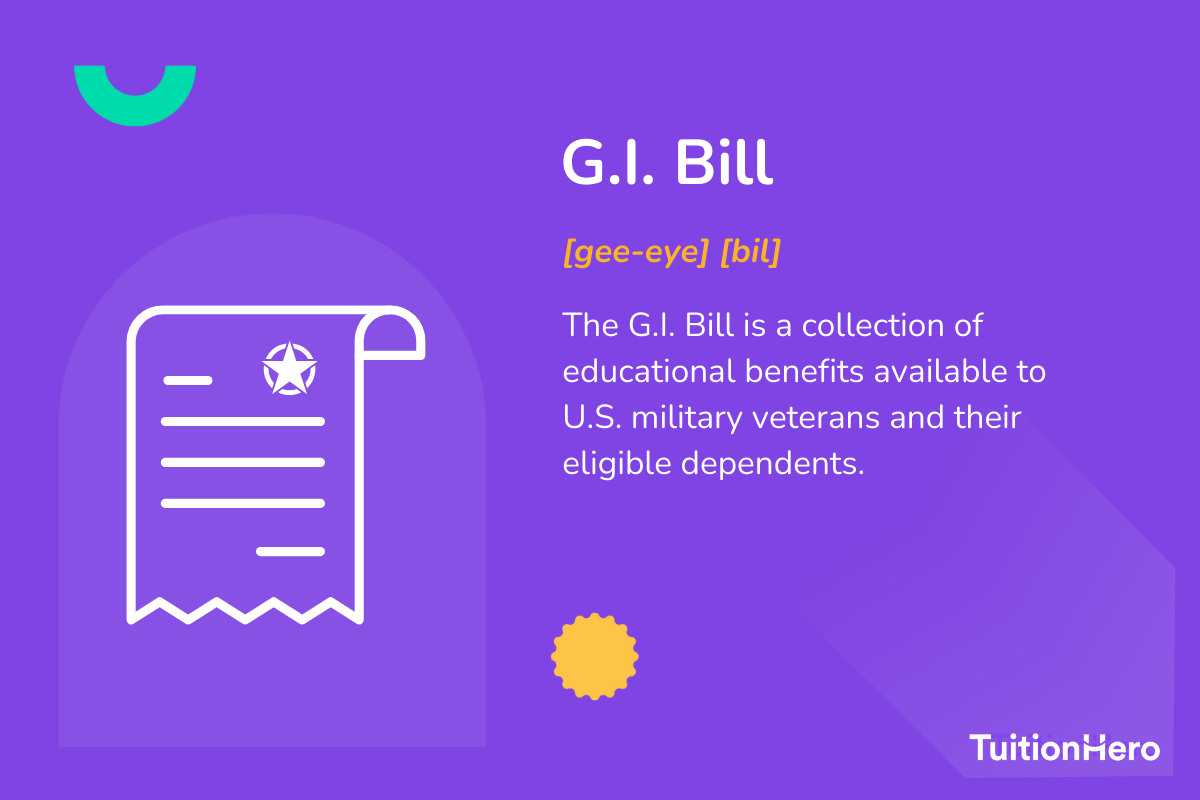Advertiser Disclosure
Last update: November 17, 2024
5 minutes read
What is the GI Bill?
Ever wondered what the GI Bill offers veterans? Learn how it helps military families with education, making it easier for them to switch from the military to civilian life.

By Derick Rodriguez, Associate Editor
Edited by Brian Flaherty, B.A. Economics
Learn more about our editorial standards



By Derick Rodriguez, Associate Editor
Edited by Brian Flaherty, B.A. Economics
Learn more about our editorial standards
Understanding the GI Bill helps you leverage its benefits and also appreciate the historical context and evolution of the bill. In this post, we’ll dive into the details of the GI Bill, its coverage, and its effects. If you’re looking into college financing options, understanding the difference between private and federal student loans can be really important. Explore how options for private student loans can complement GI Bill benefits.

Key takeaways
- Expansive benefits of the GI Bill cover more than just traditional college degrees, including vocational and on-the-job training
- Family support is a key part, offering educational opportunities to dependents of veterans
- Continual evolution of the GI Bill makes sure it meets the needs of modern service members and veterans
What is the GI Bill?
The GI Bill is a way for America to thank its veterans. It was created after World War II to help soldiers who were coming back from the war.
The GI Bill offers different benefits, like funds for education and help with getting loans for homes and businesses. This was a big change in how America showed appreciation to its veterans.
This helps veterans and their families in more than just regular school. It covers different types of learning and job training, like college and apprenticeships.
It lets them choose the paths that match their goals for jobs and personal growth. It's flexible and supports them in growing personally and moving forward in their careers.

The GI Bill has changed over time to show a stronger promise to those who serve in the military. It has different versions, like the Post-9/11 GI Bill and the Montgomery GI Bill, offering many educational benefits and support to help military members switch to civilian life. Discover how scholarship opportunities can work together with GI Bill benefits for a solid financial strategy.
Let's take a closer look at what makes up the GI Bill, its advantages, and how it directly helps military members, veterans, and their families. The GI Bill is not just something from the past; it's an active resource that keeps changing to meet the needs of the people it supports
Expanded benefits and eligibility
One of the biggest questions regarding the GI Bill concerns who exactly is eligible and the extent of benefits available. The bill covers many educational paths, with the goal of helping as many veterans as possible.
Active service members and veterans
The GI Bill helps soldiers get more education and job training. It's primarily designed for veterans who have recently exited the military, supporting different types of education and training for a smooth transition to civilian life.
Dependents and family
Another important part is the help given to the families of veterans, emphasizing how the GI Bill covers everything. Survivors and Dependents Assistance show that the program recognizes the effects of military service on families.

TuitionHero Tip
To understand better, look into information about Biden's student loan forgiveness, which is part of the broader context of support for families in education.
Historical impact and significance
The GI Bill changed America a lot. It reshaped education and gave veterans and their families new chances they never had before.
Educational advancement post-WWII
After World War II, the first GI Bill caused a big increase in college attendance. By 1956, almost half of all US WWII vets had received education or training assistance through the GI bill.
Iterations and improvements
Over time, the GI Bill has been updated to better serve the needs of America’s military. From the original 1944 legislation to the Post-9/11 GI Bill and beyond, each iteration has expanded and adapted to the changing landscape of American military and educational needs.
To understand changes in education laws, it's important to focus on the expected family contribution. This is a key part of financial aid today, showing how education is paid for and made available. Understanding these parts of the GI Bill helps beneficiaries make informed decisions, helping make sure they can maximize the benefits available to them.
Compare private student loans now
TuitionHero simplifies your student loan decision, with multiple top loans side-by-side.
Compare Rates
Dos and don'ts of utilizing the GI Bill
Understanding the GI Bill is important to get the most out of its benefits without making common mistakes. This guide will show you what to do and what to avoid.
Do
Research all the educational benefits available to you.
Apply for benefits as early as possible.
Use the GI Bill for vocational and non-degree programs if they align with your career goals.
Consult with a veterans' educational counselor for personalized guidance.
Don't
Assume your preferred program is covered without checking.
Wait until the last minute to seek academic advising.
Overlook more resources like the Yellow Ribbon Program for extra funding.
Ignore the effect of your educational choices on your eligibility.

Advantages and disadvantages of utilizing the GI Bill
The GI Bill helps people who served in the military and their families by giving them benefits for education and job training. But, like any program, it has some difficulties.
- The GI Bill covers a wide range of educational and training programs, providing flexibility.
- It supports not only veterans but also their families, showing that it helps a large number of people.
- Educational benefits are usually complemented by housing allowances, easing financial pressures.
- The program encourages higher education and professional development.
- Navigating eligibility and application processes can be tough.
- Not all educational programs or institutions are covered.
- Time limits on benefits can pressure beneficiaries into making quick educational choices.
- Some benefits might not fully cover the costs of certain universities or programs.

Why trust TuitionHero
TuitionHero makes funding your education simple. We provide private student loans, refinancing options, scholarships, and guidance on the FAFSA process. Our tools empower you to navigate the transition from military service to educational success. Let us help you secure your education beyond the GI Bill.
Frequently asked questions (FAQ)
If your school or education program doesn't accept the GI Bill, no need to stress. TuitionHero can help. We provide useful tools and links to private student loans that can help you with your finances. Our platform allows you to compare loan options and choose the one that fits your needs and educational goals.
The Yellow Ribbon Program helps with education costs that the Post-9/11 GI Bill doesn't cover. Understanding this program can be tricky, but we're here to help.
If you plan to attend an out-of-state or private college, the standard GI bill won’t cover your full tuition costs. The Yellow Ribbon program is designed to help cover at least a portion of this gap, but eligibility is up to your school’s financial aid office.
We understand that families of veterans make sacrifices, so we offer help to dependents who can get GI Bill benefits. We connect you with scholarships for military families and assist with the FAFSA for more federal aid.
Our goal is to help you reach your educational goals. We're here to guide veterans and their families toward successful academic and professional futures.
Final thoughts
The GI Bill in the United States provides important support to service members, veterans, and their families. It helps them with education, opening doors to future success.
But there are still challenges, and that's where TuitionHero comes in. We make sure no veteran or their family faces the education journey alone.
We offer many resources like private student loans, scholarships, and financial education to support you at every step. Let's go through this together, building on the past and aiming for a bright future.
Source
Author

Derick Rodriguez
Derick Rodriguez is a seasoned editor and digital marketing strategist specializing in demystifying college finance. With over half a decade of experience in the digital realm, Derick has honed a unique skill set that bridges the gap between complex financial concepts and accessible, user-friendly communication. His approach is deeply rooted in leveraging personal experiences and insights to illuminate the nuances of college finance, making it more approachable for students and families.
Editor

Brian Flaherty
Brian is a graduate of the University of Virginia where he earned a B.A. in Economics. After graduation, Brian spent four years working at a wealth management firm advising high-net-worth investors and institutions. During his time there, he passed the rigorous Series 65 exam and rose to a high-level strategy position.
At TuitionHero, we're not just passionate about our work - we take immense pride in it. Our dedicated team of writers diligently follows strict editorial standards, ensuring that every piece of content we publish is accurate, current, and highly valuable. We don't just strive for quality; we aim for excellence.
Related posts
While you're at it, here are some other college finance-related blog posts you might be interested in.
Shop and compare student financing options - 100% free!

Always free, always fast
TuitionHero is 100% free to use. Here, you can instantly view and compare multiple top lenders side-by-side.

Won’t affect credit score
Don’t worry – checking your rates with TuitionHero never impacts your credit score!

Safe and secure
We take your information's security seriously. We apply industry best practices to ensure your data is safe.
Finished scrolling? Start saving & find your private student loan rate today





